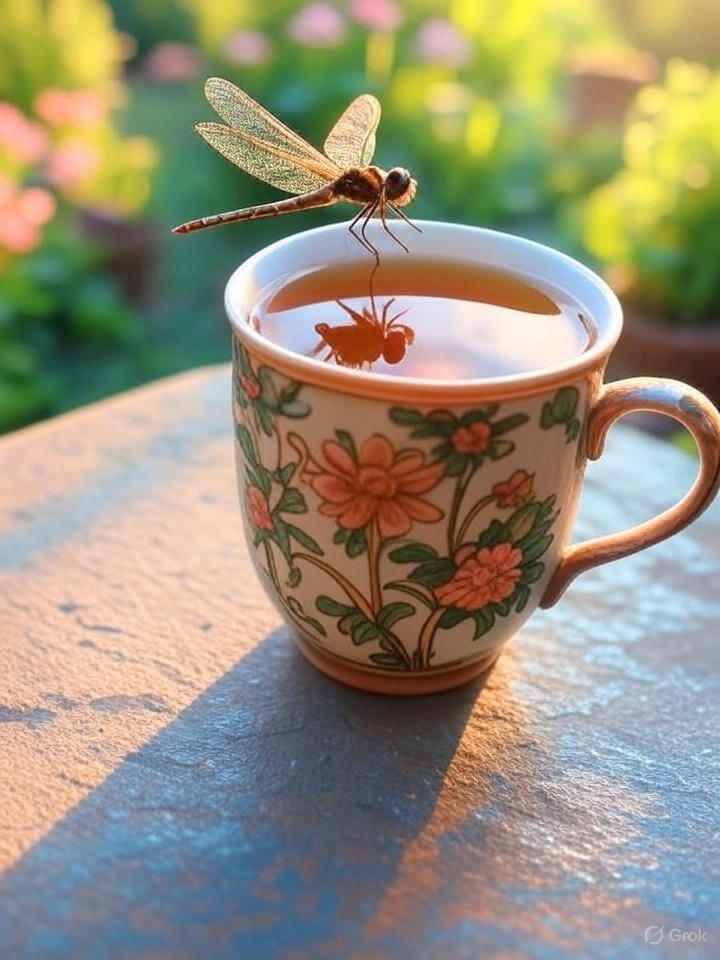Dragonfly Tea: Exploring the Art of Organic Wellness in Every Cup
In today’s wellness-centric world, tea is no longer just a beverage—it’s a ritual, a form of self-care, and for many, a lifestyle. Among the many tea brands offering tranquility and taste in every steep, dragonfly tea stands apart with its deep-rooted heritage, sustainable sourcing, and a commitment to organic living. This is not just tea—it’s a delicate fusion of art, culture, and wellness.
Before diving into the depth of organic tea culture, you might also like to explore Yogi Tea—another wellness-infused blend known for its Ayurvedic inspirations and health-enhancing herbs.
From its beginnings steeped in tradition to its evolution as a leading voice in the organic tea movement, dragonfly tea represents a mindful journey in every sip.
The Heritage Behind Dragonfly Tea
Dragonfly Tea and Its Generational Wisdom
Few tea companies have a history as rich and passionate as dragonfly tea. The brand is a family-owned British tea company with roots going back over 100 years. This long-standing legacy isn’t just about crafting delightful infusions—it’s about nurturing an age-old tradition, one that respects the harmony of nature and honors the meticulous artistry of tea-making.
Founded with a desire to reconnect people with authentic tea experiences, the brand sources its leaves from some of the most pristine and sustainable tea gardens in the world.
The Organic Philosophy: Wellness From Leaf to Cup
Why Organic Really Matters
In a market saturated with mass-produced options, dragonfly tea takes a bold step toward authenticity by insisting on certified organic ingredients. Organic tea farming eliminates harmful pesticides and synthetic fertilizers, preserving both the environment and your health.
This sustainable farming not only enhances the taste but also ensures that each cup carries the true essence of the plant. From green tea to rooibos, every infusion is a commitment to purity, balance, and organic integrity.
Crafting Wellness Through Flavourful Infusions
The Variety that Defines Dragonfly Tea
One of the defining traits of dragonfly tea is its broad spectrum of blends—each designed to serve a purpose. Whether you seek energy, detoxification, or simple relaxation, there’s a curated infusion that caters to your need. Popular options include:
- Cape Malay Chai – A spicy, warming rooibos blend with hints of cinnamon and cardamom.
- Green Tea with Ginger and Jasmine – A floral, zesty infusion perfect for mornings.
- Moonlight Jasmine – Delicate white tea leaves blended with jasmine blossoms for nighttime serenity.
Each blend is carefully crafted, using traditional methods and modern wellness insights to create something more than just a beverage—it’s a therapeutic experience.
Sustainability in Every Sip
Eco-Conscious Packaging and Practices
What sets dragonfly tea further apart is its deep commitment to sustainability. From biodegradable tea bags to recyclable packaging, the brand ensures that your cup of tea leaves a minimal footprint. Sourced responsibly from organic farms, the ingredients are chosen not only for their taste but for their ethical value.
Even the suppliers are held to rigorous environmental standards. It’s a closed-loop system of care that begins with the soil and ends with a soothing, aromatic infusion.
Celebrating the Ritual of Tea with Dragonfly Tea
Beyond the ingredients, beyond even the ethical sourcing, there lies the ritual—the simple yet profound act of brewing tea. For centuries, tea ceremonies have symbolized peace, mindfulness, and connection.
With dragonfly tea, this ancient practice finds new life. The intentional process of selecting a blend, boiling water, steeping leaves, and inhaling the aroma—all cultivate a moment of stillness in a busy day.
Bringing Tradition to the Modern Table
The Innovation Behind Ancient Wisdom
While dragonfly tea stays true to tradition, it’s not stuck in the past. The brand continually explores innovative blends and infusions that reflect today’s wellness needs. This includes adaptogenic herbs, superfoods, and functional teas for sleep, digestion, and immunity.
One standout product is their Botanical Infusions Range, which incorporates lesser-known ingredients like moringa, turmeric, and ashwagandha—all expertly paired to enhance flavor and function.
In the Heart of Every Cup
Midway through your journey with dragonfly tea, you begin to notice more than flavor. There’s a sense of grounding, clarity, and calm. That’s because these teas are made not only with your health in mind but also with a spiritual awareness of balance and harmony.
A cup isn’t just a warm drink—it’s a reminder to pause, breathe, and reconnect with yourself.
How to Brew the Perfect Cup
Tips for Optimal Flavor and Aroma
To make the most out of your dragonfly tea, consider these simple yet effective brewing techniques:
- Use fresh, filtered water – Water quality significantly affects taste.
- Steep at the right temperature – White and green teas need cooler water, while black and herbal blends benefit from boiling water.
- Don’t over-steep – Most teas should steep for 3-5 minutes.
- Cover your cup – This traps essential oils and aromas during brewing.
Even the act of brewing becomes meditative, further enhancing the tea-drinking experience.
Tea as a Lifestyle Choice
Tea has evolved from a cultural tradition into a lifestyle trend driven by mindfulness, wellness, and intentional living. Choosing dragonfly tea means aligning with a lifestyle rooted in organic wellness, environmental respect, and soulful nourishment.
It’s about more than what’s in your cup—it’s what you bring into your life.
Dragonfly Tea vs. Other Organic Brands
When compared to other organic teas on the market, dragonfly tea consistently shines for its transparency, variety, and flavor complexity. While many brands may offer organic certification, few can match the rich history, cultural authenticity, and sustainability ethics that this brand holds dear.
It doesn’t simply join the organic movement—it leads it with grace and purpose.
Where to Buy Dragonfly Tea
Dragonfly tea is widely available in health food stores, online retailers, and specialty shops. However, for a reliable and diverse selection, you can always explore their blends on Nature’s Healthbox—a curated platform offering trusted wellness products.
Final Thoughts: Why Choose Dragonfly Tea?
In an age of artificial additives and fast-paced living, dragonfly tea invites you to slow down, savor, and sip with intention. Whether it’s the soothing taste of jasmine, the earthy depth of rooibos, or the vitality of green tea, every cup is a celebration of nature’s purity and tradition’s wisdom.
So next time you reach for a tea bag, remember—it’s not just what you drink, but how and why you drink it. With dragonfly tea, organic wellness is not a goal; it’s an experience poured gently into every cup.
Frequently Asked Questions (FAQs)
What are the health benefits of herbal teas?
Herbal teas can aid digestion, improve sleep, reduce stress, and support the immune system. Each herb offers unique health benefits depending on its natural compounds.
Are caffeine-free teas effective for energy?
Yes, many caffeine-free teas include adaptogens or stimulating herbs like ginseng or licorice root, which can enhance natural energy levels without the crash.
How do I choose the right tea for my mood?
Look for teas that match your needs: chamomile or lavender for relaxation, peppermint for digestion, or ginger for invigoration.
Can I drink herbal teas every day?
Absolutely. Many herbal teas are safe for daily consumption and can be part of a healthy lifestyle. However, moderation is key with certain potent herbs.
What’s the difference between white, green, and black tea?
The difference lies in how the leaves are processed. White tea is the least processed, green is lightly oxidized, and black tea is fully oxidized, giving each a distinct flavor and caffeine level.
Is loose-leaf tea better than tea bags?
Loose-leaf tea often offers better quality and fuller flavor, but many premium brands now offer high-quality bagged options using whole leaves.
How should tea be stored for freshness?
Store tea in an airtight container away from light, moisture, and strong odors. This helps preserve its flavor and nutritional properties.
What time of day is best for drinking tea?
It depends on the type—green or black tea is ideal for mornings, while herbal and caffeine-free blends are perfect for evenings.
Are there any teas safe for children?
Yes, many mild herbal teas like chamomile or rooibos are child-friendly, but always consult a healthcare provider before offering them regularly.
Can I mix different teas together?
You can, but be mindful of flavor profiles and herb interactions. Blending should complement, not overpower, the properties of each tea.




